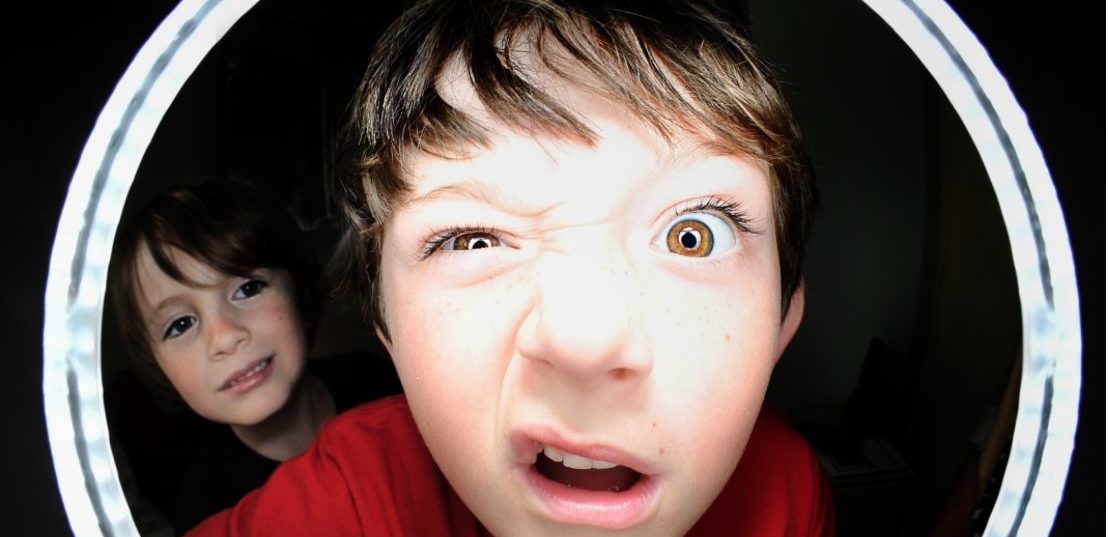 Stress is on the rise – especially after the recent election. Fortunately, a bit of emotional intelligence will help you dissolve stress the fun way: Humor! Here’s how to use emotional intelligence to fuel laughter to manage stress.
Stress is on the rise – especially after the recent election. Fortunately, a bit of emotional intelligence will help you dissolve stress the fun way: Humor! Here’s how to use emotional intelligence to fuel laughter to manage stress.
When Was the Last Time You Laughed?
The terribly stressful events of recent weeks–I write in the aftermath of the 2016 presidential election–might see some of us sinking into despair and to worry for our futures and those of our loved ones and our communities. No matter whom you supported, the escalation of tension in our communities has raised stress levels for everyone. But these events also provide a ready excuse to laugh; and I would argue humor may be one of the best ways we can choose to respond to difficult days.

Laughter for Peace
Evolutionary biologists have long wondered why humans laugh. Studies show that humor decreases aggression and stress and promotes cooperation and fairness between people. More practically, humor and playful emotions are contagious and are used to defuse social tension and avoid fighting. So sharing a joke can actually be a way to spread peace helping us through tough times. Laugher improves our emotional well being including self-efficacy, positive affect, and optimism. Laughter develops inner strength. Have you heard someone facing adversity say “the only thing I can do now is is laugh about it.” Laugher is a powerful force when we need courage. Humor may be the silver lining that helps us connect in times of conflict.
Laughter to Manage Stress
Laughter should be encouraged, and not only because it sounds so wonderful. Health researchers have repeatedly cited the benefits of a good laugh, from lowered blood pressure and stress levels, a helpful boost to the immune system, improved heart function, reduce pain, and increased endorphin levels. It seems impossible but researchers have shown that watching a humorous video for 20 minutes can significantly lower stress levels, on a level comparable to 20 minutes of exercise. There is even a new meditative practice called Laughter Yoga where participants voluntarily laugh rather than spontaneous laugh because your brain can’t tell the difference and you still get the health benefits (and have a good time doing it!) Laughing can dispel sadness, resentment and anger, refocusing our attention on the positive and shifting our concerns to the back burner.

How Often Do You Laugh?
Firm, accurate numbers are hard to find, but it seems that we adults allow ourselves to laugh some seventeen times a day, on average. Most of this laughter doesn’t happen alone; in fact, most people find that they remain nearly silent, even during a funny movie or comedy show, enjoying the humor internally. It’s when we spend time with others that we laugh out loud, in that unself-conscious way which speaks of genuine amusement and the sharing a moment of joy.

Now, let’s consider that the average child laughs many more times a day– hundreds, according to some research–and try to figure out why that might be. We’ve all met children who laugh at the tiniest thing, perhaps something an adult would overlook or ignore. They seem to be able to find humor in those inconsequential moments of confusion, randomness, error and happenstance within which adults assume there is little to laugh about. Laughter is often generated by a surprise to the brain. I vote for more surprises.
A Laughing Matter
So, if the natural state of a child is to be open to humor and ready to laugh, it should stand to reason that children laugh equally often in their classrooms. Data is hard to gather, but I’m going to go out on an unscientific limb and worry out-loud that children aren’t laughing nearly enough when they’re at school. We can all imagine the raucous, gleeful sound of a group of children finding something hilarious, but how often do educators actually hear that invaluable sound?
 How can we bring to our businesses, communities, families and classrooms these opportunities for laughter? Classrooms, for example, can be terribly dull environments, with amusement or light-heartedness stymied by the strange formality of the circumstances. Giving your students permission to laugh–by doing so yourself and by retaining a cheerful atmosphere should be goal for the year. Building a rapport with those with whom we work or those with whom we play depends on being able to laugh together, and also to allow others to laugh at you.
How can we bring to our businesses, communities, families and classrooms these opportunities for laughter? Classrooms, for example, can be terribly dull environments, with amusement or light-heartedness stymied by the strange formality of the circumstances. Giving your students permission to laugh–by doing so yourself and by retaining a cheerful atmosphere should be goal for the year. Building a rapport with those with whom we work or those with whom we play depends on being able to laugh together, and also to allow others to laugh at you.
At one school where I was the Executive Director, I am a ridiculous picture of myself dressed up as a character in a Dr. Seuss book—and, no, it was not Halloween. What a silly, funny day. One year—when I wanted daily laughter, I asked my staff to tell me a joke that each time I greeted them in the morning. I want to do that year again.
Laughing more doesn’t mean becoming an unprofessional clown who seeks to create only vapid amusement. Taking a light-hearted approach to your work, to yourself, and to your own failings and foibles stands you in good stead.
 As a young teacher, I invented the ‘homework Gremlin’ who would borrow or steal my students’ papers so that I couldn’t grade them. This character became an (admittedly extremely flimsy) comedic excuse for a severely overworked teacher who wasn’t finding enough hours in the day to grade everything that arrived on her desk. But the students loved how I stepped out of my formal character and joked about this invisible monster who was wrecking my carefully laid plans to assiduously read all of my students’ assignments on the same day they were submitted. And, when they came to me with the story that the homework Gremlin had eaten their homework—I bought it and we both laughed.
As a young teacher, I invented the ‘homework Gremlin’ who would borrow or steal my students’ papers so that I couldn’t grade them. This character became an (admittedly extremely flimsy) comedic excuse for a severely overworked teacher who wasn’t finding enough hours in the day to grade everything that arrived on her desk. But the students loved how I stepped out of my formal character and joked about this invisible monster who was wrecking my carefully laid plans to assiduously read all of my students’ assignments on the same day they were submitted. And, when they came to me with the story that the homework Gremlin had eaten their homework—I bought it and we both laughed.
Laughter for Relationships
We all make mistakes, and many of them are either inconsequential, or funny. If others see that you’re making light of your inevitable fallibility, a whole new atmosphere is created. Growing and learning becomes a shared journey, one undertaken by both teacher and students (or doctor and patient or lawyer and client or storekeeper and customer) together, and one in which laughter can smooth the road. If we can readily humanize ourselves in this way, breaking down those barriers between roles or responsibilities, communication can be improved. It’s how we find shared ground–the way in which our human experiences overlap–despite so many other differences and potential divisions.
 So, begin your class (or meeting or family dinner) by inviting all participants to share some jokes, and include one of your own. Always be reading and willing to poke fun at yourself as well. Modelling this behavior helps others to see to laughing at oneself is an invaluable life skill. The breaking down of these barriers, and the accompanying laughter, are priceless elements to a successful environment (family, business, hospital), and to the improved happiness of all of us who inhabit the earth.
So, begin your class (or meeting or family dinner) by inviting all participants to share some jokes, and include one of your own. Always be reading and willing to poke fun at yourself as well. Modelling this behavior helps others to see to laughing at oneself is an invaluable life skill. The breaking down of these barriers, and the accompanying laughter, are priceless elements to a successful environment (family, business, hospital), and to the improved happiness of all of us who inhabit the earth.
The Laughter Connection
Laughter is a path to shared experiences and increasing positive interactions. Remember that data about kids laughter frequency? The researchers looking at the adult/child laugh ratio disparity wondered why children laugh so much more. They found the answer lies in the number of interactions. Looking at mother/infant ratios, rates of laughter were almost equal because of the high level of interaction. Being with children increases laughter–any grandparent would agree! It seems that the frequency of laughter for all ages is dependent on how much time people spend together. The key message is that if we want to increase our laughter quota, we need to increase our connections and reduce our self-isolation.
Laughter for Hope
Laughter is hope for challenging times. Humor can be a tool for bridging the divide between people because it’s at the foundation of strong relationships good for our health, and gives us courage to keep going. How else can we encourage laughter? Can we start breakfast with a new joke on the fridge? Can we make a funny face as we kiss our partner goodbye? Can we use our phone to text more jokes? Can we pass out comics at a meeting?
 Let’s start a list. Send me the ways you bring more laughter to all those with whom you are sharing the journey.
Let’s start a list. Send me the ways you bring more laughter to all those with whom you are sharing the journey.
- 87 Ways to Be Kind and Loving - June 27, 2022
- 13 Tips to Reduce Stress & Anxiety During Covid-19 - April 8, 2021
- 6 Tips for Making the Best of Your Reality - October 12, 2020


Annabel,l will try to practice it step by step.many thanks to you….
Annabel, I am so grateful for your wise and wonderful insights. Humour may be the missing link between surviving and thriving.
entertainer since I was a wee lad.
It has made an amazing difference in my life and in the life of many others. My favorite pastime is to make you laugh. All my humor is tasteful, spontaneous and in the moment.
Recently due to some tough times I found myself losing that lifelong edge and finding it difficult to laugh. Finally I am on the humorous road to recovery and know I will be back to my not so old self soon.
Laughter helps cure ailments both physical and emotional. Laughter makes your day and life so much better. Laughter attracts similar people to you and you to them. Laughter improves your focus, work ethics and determination. Laughter is an intrinsic part of world peace.
Proverbs 17:22 A joyful heart is good medicine, but a crushed spirit dries up the bones.
Proverbs 15:13 A glad heart makes a cheerful face, but by sorrow of heart the spirit is crushed.